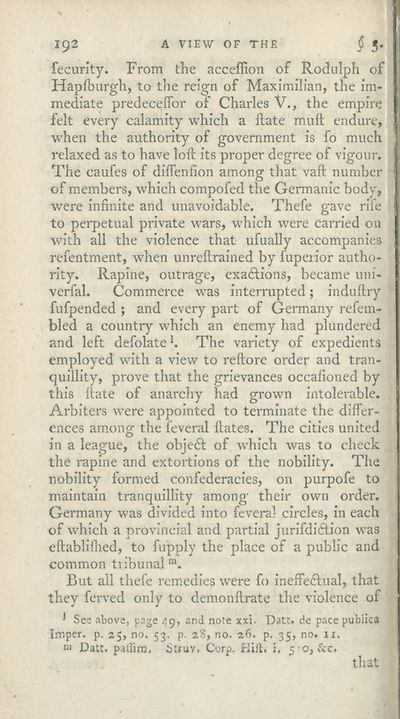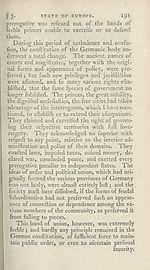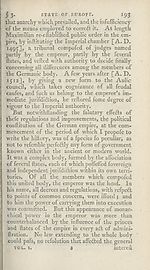Download files
Complete book:
Individual page:
Thumbnail gallery: Grid view | List view

A VIEW OF THE
I92
§ 3’
fecurity. From the accefiton of Rodulph of
Hapfburgh, to the reign of Maximilian, the im¬
mediate predeceffor of Charles V., the empire
felt every calamity which a Hate mult endure,
when the authority of government is fo much
relaxed as to have loft its proper degree of vigour.
The caufes of diffenfion among that vaft number
of members, which compofed the Germanic body,
were infinite and unavoidable. Thefe gave rife
to perpetual private wars, which were carried on
with all the violence that ufually accompanies
refentment, when unreftrained by fupeiior autho¬
rity. Rapine, outrage, exactions, became uni-
verfal. Commerce was interrupted; induftry
fufpended ; and every part of Germany refem-
bled a country which an enemy had plundered
and left defolate *. The variety of expedients
employed with a view to reftore order and tran¬
quillity, prove that the grievances occafioned by
this fiate of anarchy had grown intolerable.
Arbiters were appointed to terminate the differ¬
ences among the feveral ftates. The cities united
in a league, the objedt of which was to check
the rapine and extortions of the nobility. The
nobility formed confederacies, on purpofe to
maintain tranquillity among their own order.
Germany was divided into feveral circles, in each
of which a provincial and partial jurifdiction was
eftablifhed, to fupply the place of a public and
common ttibunalm.
But all thefe remedies were fo ineffeftual, that
they ferved only to demonftrate the violence of
1 Ses above, page 49, and note xxi. Datt. de pace publics
Imper. p. 25, no. 53. p. 2S, no. 26. p. 35, no. 11.
m Date, paliira. Struv, Corp. Kid. i. 5 0, &c.
that
I92
§ 3’
fecurity. From the accefiton of Rodulph of
Hapfburgh, to the reign of Maximilian, the im¬
mediate predeceffor of Charles V., the empire
felt every calamity which a Hate mult endure,
when the authority of government is fo much
relaxed as to have loft its proper degree of vigour.
The caufes of diffenfion among that vaft number
of members, which compofed the Germanic body,
were infinite and unavoidable. Thefe gave rife
to perpetual private wars, which were carried on
with all the violence that ufually accompanies
refentment, when unreftrained by fupeiior autho¬
rity. Rapine, outrage, exactions, became uni-
verfal. Commerce was interrupted; induftry
fufpended ; and every part of Germany refem-
bled a country which an enemy had plundered
and left defolate *. The variety of expedients
employed with a view to reftore order and tran¬
quillity, prove that the grievances occafioned by
this fiate of anarchy had grown intolerable.
Arbiters were appointed to terminate the differ¬
ences among the feveral ftates. The cities united
in a league, the objedt of which was to check
the rapine and extortions of the nobility. The
nobility formed confederacies, on purpofe to
maintain tranquillity among their own order.
Germany was divided into feveral circles, in each
of which a provincial and partial jurifdiction was
eftablifhed, to fupply the place of a public and
common ttibunalm.
But all thefe remedies were fo ineffeftual, that
they ferved only to demonftrate the violence of
1 Ses above, page 49, and note xxi. Datt. de pace publics
Imper. p. 25, no. 53. p. 2S, no. 26. p. 35, no. 11.
m Date, paliira. Struv, Corp. Kid. i. 5 0, &c.
that
Set display mode to:
![]() Universal Viewer |
Universal Viewer | ![]() Mirador |
Large image | Transcription
Mirador |
Large image | Transcription
| Antiquarian books of Scotland > Kings & rulers > History of the reign of the Emperor Charles V. > Volume 1 > (210) |
|---|
| Permanent URL | https://digital.nls.uk/109184851 |
|---|
| Description | By William Robertson. London : Cadell and Davies, 1798. |
|---|---|
| Shelfmark | ABS.1.76.13 |
| Additional NLS resources: | |
| Description | Thousands of printed books from the Antiquarian Books of Scotland collection which dates from 1641 to the 1980s. The collection consists of 14,800 books which were published in Scotland or have a Scottish connection, e.g. through the author, printer or owner. Subjects covered include sport, education, diseases, adventure, occupations, Jacobites, politics and religion. Among the 29 languages represented are English, Gaelic, Italian, French, Russian and Swedish. |
|---|

